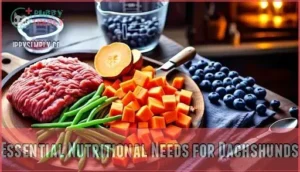This site is supported by our readers. We may earn a commission, at no cost to you, if you purchase through links.

These long-backed dogs face unique nutritional challenges that store-bought food often misses, from calcium ratios that protect their spines to fiber levels that prevent the weight gain their frames can’t bear.
When you control what goes into your dachshund’s bowl, you’re not just cooking—you’re tailoring every meal to support those short legs, that vulnerable back, and a digestive system that’s pickier than most owners realize. Getting the balance right takes some knowledge, but the payoff shows up in energy levels, coat shine, and fewer trips to the vet.
Table Of Contents
- Key Takeaways
- Why Choose Homemade Food for Dachshunds?
- Essential Nutritional Needs for Dachshunds
- Safe Ingredients and Foods to Avoid
- How to Prepare Homemade Dachshund Food
- Consulting Your Vet and Monitoring Health
- Frequently Asked Questions (FAQs)
- What is the healthiest food to feed a Dachshund?
- What to cook for my Dachshund?
- What do vets recommend for homemade dog food?
- What is Dachshunds favourite food?
- How do I transition my dachshund from commercial kibble to homemade food?
- What are some simple homemade dog food recipes for beginners?
- How do I transition from commercial to homemade?
- What kitchen equipment is needed for meal prep?
- Can I batch cook and freeze homemade meals?
- How much does homemade food cost per month?
- Conclusion
Key Takeaways
- Homemade diets for dachshunds allow precise control over calcium ratios and fiber levels that protect their vulnerable spines and prevent weight gain, addressing breed-specific structural vulnerabilities that commercial foods often overlook.
- Over 95% of homemade dog food recipes lack at least one essential nutrient (particularly calcium, vitamin D, zinc, and omega-3s), making veterinary consultation and targeted supplementation critical rather than optional.
- The ideal dachshund diet consists of roughly 80% quality protein sources with moderate fat, combined with careful portion control—since even a few extra pounds create dangerous strain on their elongated backs.
- Successful homemade feeding requires weekly weight tracking, biannual vet reviews, and watching for subtle deficiency signs like coat dullness or unexplained stiffness, as nutritional imbalances often appear gradually before becoming obvious problems.
Why Choose Homemade Food for Dachshunds?
You’ve probably wondered if homemade meals might be better for your Dachshund than that bag of kibble sitting in your pantry. The good news is that cooking for your wiener dog can offer some real advantages, from better digestion to easier weight control.
Let’s look at four key reasons why making your Dachshund’s food at home might be worth the effort.
Benefits for Health and Digestion
When you switch your Dachshund to a thoughtfully prepared homemade diet, you’re not just changing what’s in the bowl—you’re often giving their entire digestive system a chance to reset and thrive. Studies show that 94% of dogs with digestive or skin issues improved after switching to homemade food.
You’ll likely notice symptom relief, better stool quality, and a shinier coat—clear signs your pup’s digestive health is flourishing.
Better Nutrient Control
One of the biggest wins of going homemade is that you get to decide exactly what nutrients—and how much of each—go into every single meal your Dachshund eats.
You control ingredient sourcing, precise portioning, and supplement timing to match your dog’s unique nutritional needs.
Recipe customization means you can adjust protein ratios and bioavailability factors specifically for Dachshund health and nutrition, creating truly individual canine nutrition instead of guessing what’s inside commercial kibble.
Avoiding Allergens and Additives
Commercial dog foods are loaded with preservatives, fillers, and mystery proteins that can trigger allergies or upset your Dachshund’s stomach—but when you cook at home, you sidestep all that hidden junk.
You’re eliminating common allergens and ingredient sensitivities by choosing whole foods your dog actually recognizes:
- No artificial preservatives like BHA, BHT, or ethoxyquin that worsen canine allergies
- Clear protein sources instead of vague "meat meal" on labels
- Additive alternatives like natural vitamin E over synthetic chemicals
- Elimination diets become simple when tracking food sensitivities in your dog’s nutrition plan
Weight Management and Obesity Prevention
Keeping your Dachshund lean isn’t just about looks—it’s about protecting that long back from the extra strain that even a few pounds can cause.
With homemade healthy dog food, you control portion sizing and calorie control precisely. Regular weigh-ins help you catch weight creep early, while an exercise regimen and smart treat alternatives keep obesity at bay without sacrificing your pup’s joy.
Essential Nutritional Needs for Dachshunds
Getting the nutrition right for your Dachshund isn’t just about filling their bowl—it’s about supporting their unique body shape and preventing common health issues. Your wiener dog has specific needs that differ from other breeds, especially with protecting that long spine.
Let’s walk through the key nutritional building blocks you’ll need to keep in mind when creating homemade meals.
Optimal Protein and Fat Ratios
Your Dachshund’s body runs best on fuel that looks a lot like what wild canines would eat—and that means getting the protein and fat ratios just right. Aim for roughly 6 parts lean protein to 1 part carbohydrate in healthy dog food.
Quality protein sources like turkey or beef should make up about 80% of the meal, with moderate fat keeping their coat shiny without packing on pounds. Getting this ratio wrong risks deficiency and poor dog nutrition.
Importance of Calcium, Fiber, and Probiotics
Beyond the protein that fuels your Dachshund’s muscles, three nutritional sidekicks—calcium, fiber, and probiotics—quietly do the heavy lifting in keeping those long spines strong and that sensitive digestion humming smoothly.
Ground eggshells offer natural calcium sources for bone health, while ground flaxseeds deliver fiber benefits that support digestive health.
Probiotic strains maintain gut balance—just watch your supplement dosage to avoid throwing off your dog nutrition plan.
Age, Weight, and Activity Adjustments
From puppyhood to their golden years, a Dachshund’s nutritional needs shift like gears—what fuels a bouncing six-month-old won’t cut it for a senior snoozing on the couch. Adjust your homemade meals based on these factors:
- Puppy food needs higher calories and calcium for growth spurts
- Senior diets require fewer calories but more joint-supporting nutrients
- Activity levels directly impact portion control requirements
- Weight changes signal when to tweak your canine diet formula
- Weight management prevents back strain in aging Dachshunds
Common Nutritional Deficiencies to Avoid
Even veterinary-formulated recipes stumble—over 95% of homemade dog food recipes lack at least one essential nutrient. Watch for calcium imbalance and vitamin deficiencies (especially vitamin D), which trigger bone issues in Dachshunds. Most homemade diets miss zinc, iron, and vitamin E, causing dull coats and lethargy. Omega-3 shortage leads to joint problems and inflammation.
Over 95% of homemade dog food recipes lack essential nutrients like calcium, vitamin D, zinc, and omega-3s, risking bone problems and poor coat health in Dachshunds
Without professional formulation and quality control, you’re basically guessing. Add targeted vitamin supplements and consult your vet—your Dachshund’s canine health depends on proper nutrients, not good intentions. A balanced diet is key for their overall well-being.
Safe Ingredients and Foods to Avoid
When you’re preparing homemade meals for your Dachshund, knowing what’s safe and what’s off-limits makes all the difference.
Some ingredients provide excellent nutrition, while others can cause serious harm—even in small amounts.
Let’s look at what belongs in your dog’s bowl and what you should keep far away from it.
Recommended Proteins, Grains, and Vegetables
Building a wholesome homemade meal starts with choosing the right foundation—lean proteins, whole grains, and colorful vegetables that work together like a well-balanced orchestra.
Your dog food ingredients and benefits should include chicken, turkey, or beef for muscle support, brown rice or oatmeal for healthy grains, and carrots, green beans, or sweet potatoes as safe vegetables.
This ingredient variety delivers nutrients and dietary fiber your dachshund needs for peak digestion.
Dachshund-Safe Supplements and Additions
Think of supplements as the finishing touches that turn a good meal into a great one—they fill the gaps that whole foods alone might leave behind.
- Eggshell calcium aids bone health and mineral balance, especially important for your dachshund’s long spine
- Flaxseed fiber delivers omega-3s and digestive support, boosting nutrient absorption in homemade dog food
- Probiotic benefits and vitamin E strengthen immunity and skin health, rounding out your dog food ingredients and benefits
These additions help you customize nutrients when adding nutrients to your dachshund’s diet truly needs.
Toxic and Harmful Foods for Dachshunds
Just as important as choosing the right nutrients is knowing what to keep out of your dog’s bowl. Chocolate toxicity can cause seizures in dachshunds—dark chocolate is especially dangerous. Xylitol dangers lurk in sugar-free treats, triggering liver failure within hours. Allium poisoning from onions and garlic destroys red blood cells. Grape risks include sudden kidney failure, while alcohol hazards and unbaked dough can lead to coma. These toxic ingredients have no place in your dog’s diet. Even small amounts of macadamia nuts can be poisonous.
How to Prepare Homemade Dachshund Food
Making homemade food for your Dachshund doesn’t have to feel overwhelming once you know the basics. The key is following a few straightforward steps to make certain meals are balanced, safe, and properly stored.
Let’s walk through the essential methods and tips you’ll need to feed your pup with confidence.
Step-by-Step Cooking Instructions
Cooking homemade meals for your Dachshund doesn’t have to feel like a chemistry experiment—once you’ve got the basics down, it’s easier than you might think.
Start with ingredient prep: wash vegetables thoroughly, measure proteins accurately, and cook grains until soft. Use gentle cooking methods like boiling or baking to preserve nutrients.
Batch cooking saves time—prepare several days’ worth at once, adjusting food texture based on your pup’s preference for chunky or finely ground meals.
Recipe Ideas and Balanced Meal Examples
Once you’ve nailed the cooking process, the fun part begins—mixing and matching ingredients to create balanced meals your Dachshund will actually get excited about.
Try a DIY recipe with ground turkey, sweet potato, and green beans—roughly 80% protein, 20% carbs and veggies for balanced ratios. Ingredient swaps like lean beef for chicken keep things interesting, while meal planning with nutritional information guarantees healthy dog food recipes meet their needs without guesswork.
Portion Sizes and Feeding Frequency
Getting the portion right matters just as much as what goes into the bowl—too little leaves your Dachshund hungry, too much can pile on pounds their long backs simply can’t afford to carry.
Start with a calorie calculation based on activity levels—a 20-pound adult usually needs around 500 calories daily, while puppy portions run higher for growth. Use a dog food calculator for precision, feed twice daily for weight control, and make senior adjustments as metabolism slows.
Proper Storage and Food Safety Tips
Safe storage isn’t optional when you’re dealing with homemade meals—one careless slip can turn a nutritious dinner into a bacterial breeding ground that puts your Dachshund at serious risk.
Follow these safe practices rules for your homemade dog food:
- Refrigerate immediately – Store cooked dog food in airtight containers for up to 3 days maximum; anything longer requires freezing portions to maintain shelf life.
- Prevent cross-contamination – Use separate cutting boards and utensils for your dog diet prep, washing everything thoroughly with hot soapy water.
- Label and date batches – Mark containers clearly so you know exactly when each meal was prepared, supporting better dog care and pet ownership practices.
Consulting Your Vet and Monitoring Health
Making your own dog food is just the beginning—keeping your Dachshund healthy means staying on top of how they’re doing with it. Your vet plays a key role in making sure your homemade meals hit the mark, and you’ll need to watch for signs that tell you if things are working or need tweaking.
Here’s what to focus on to keep your pup thriving.
Vet-Recommended Diet Adjustments
Your vet isn’t just a safety net—they’re your partner in fine-tuning homemade dog food recipes to your dachshund’s unique needs. Calorie needs vary widely; most dachshunds need 200–300 kilocalories daily, but activity level and neuter status can shift that by 20%.
Protein adjustments and fat intake often require tweaking for allergies or pancreatitis risk. Supplementation—especially calcium and omega-3s—closes nutritional gaps that 95% of DIY recipes miss.
Schedule dietary review twice yearly to keep nutrients on track.
Watching for Nutritional Imbalances
Even if your dachshund seems to be thriving on homemade meals, subtle signs of nutritional trouble can creep in quietly—before you notice anything’s wrong. Watch for deficiency symptoms like lethargy, dull coat quality, or scratching that hints at nutritional imbalances. Supplement timing matters—too much calcium crowds out other nutrients your pup needs.
- Dry, flaky skin often signals missing omega-3s or inadequate hydration monitoring
- Unexplained limping or stiffness may reveal calcium-phosphorus imbalances affecting bones
- Chronic ear infections or itching could mean allergies or toxin exposure from improper ingredients
Tracking Weight and Health Changes
Your dachshund’s bathroom scale tells a story—you just need to know how to read it. Weigh your pup weekly at the same time, tracking patterns rather than obsessing over single numbers. Weight fluctuation of more than 5% in a month deserves attention.
Monitor coat condition and energy levels alongside stool analysis—they reveal how well your homemade recipe meets nutritional needs.
| Health Marker | What to Track | Red Flags |
|---|---|---|
| Weight & Body | Weekly weigh-ins, rib visibility | Sudden gain/loss, bloating |
| Coat & Energy | Shine, shedding patterns, playfulness | Dullness, lethargy, excessive scratching |
| Digestion | Stool consistency, appetite changes, bowel frequency | Persistent diarrhea, refusal to eat |
When to Consider Commercial Alternatives
Sometimes the best recipe is the one you don’t have to make from scratch—and recognizing when to switch back to commercial food is a skill that’ll save your sanity and your dachshund’s health.
Consider commercial alternatives when:
- Travel considerations make meal prep impossible—quality kibble beats skipped meals on road trips
- Budget constraints push monthly costs beyond what pet insurance covers for nutritional content of dog food
- Time limitations from life changes mean you’re consistently cutting corners on recipes
- Dietary consistency becomes impossible to maintain, risking nutritional gaps
- Emergency situations or persistent allergies require specialized therapeutic pet food formulations
High-quality commercial diets aren’t admitting defeat—they’re smart planning.
Frequently Asked Questions (FAQs)
What is the healthiest food to feed a Dachshund?
For most Dachshunds, the healthiest diet combines lean proteins, nutrient-dense veggies, and careful Portion Control—whether you’re exploring Raw Feeding or cooked Homemade dog food.
The best Diet considers Breed Specifics like back health while meeting Supplement Needs, especially for picky eaters.
What to cook for my Dachshund?
Balanced homemade dog food recipes usually combine lean proteins like ground turkey or chicken with cooked brown rice, sweet potatoes, and dog-safe vegetables such as carrots and green beans, ensuring proper ingredient sourcing and cooking methods for best nutrition.
What do vets recommend for homemade dog food?
Most veterinarians won’t hand you a single "perfect" recipe—because there isn’t one. Instead, vet-approved recipes balance protein, healthy fats, and carbohydrates while including supplement recommendations like calcium and omega-3s, paired with portioning guidelines adapted to your dog’s weight and activity level.
What is Dachshunds favourite food?
Most wiener dogs lean toward high-protein foods like turkey, chicken, and beef paired with rice and veggies. They’re picky eaters, so texture matters—many prefer moist, aromatic meals.
Palatability factors and breed specifics mean taste preferences vary, but treat variety keeps them interested.
How do I transition my dachshund from commercial kibble to homemade food?
A slow switch is key—mix 25% homemade with 75% kibble for three days, then go 50-50, gradually increasing until you’re fully transitioned over 7-10 days to avoid tummy troubles.
What are some simple homemade dog food recipes for beginners?
Start with a classic turkey-and-rice blend: brown one pound ground turkey, mix with two cups cooked brown rice, one cup steamed carrots, and half a cup peas—simple enough for any beginner’s first batch.
How do I transition from commercial to homemade?
Gradual introduction is key—mix 25% homemade food with 75% commercial for three days, then shift to 50/50, watching stool consistency and palatability issues.
Monitor for allergies while switching to new dog food, adjusting supplement timing as needed.
What kitchen equipment is needed for meal prep?
You’ll need a food processor for grinding meats and veggies, a Dutch oven or large pot for cooking ingredients, accurate measuring tools for portion control, airtight storage containers for your dog food recipe batches, and basic safety equipment like cutting boards and thermometers when following cooking instructions.
Can I batch cook and freeze homemade meals?
Yes, batch cooking and freezing homemade dog food is practical and time-saving. Portion meals into containers, freeze for up to three months, and thaw safely in the refrigerator overnight to preserve nutrients.
How much does homemade food cost per month?
For a 30-pound dog, expect around $50-70 monthly. Ingredient price impact varies—bulk buying strategies help.
Supplement cost analysis matters too. Recipe variation costs differ, but calculating dog food amounts and long-term cost savings often beat premium commercial options.
Conclusion
Think of your dachshund’s spine as a bridge—the right fuel determines how well it holds up under daily traffic. When you commit to preparing dachshunds homemade dog food, you’re not just filling a bowl; you’re building a defense against back problems, joint strain, and digestive issues that plague the breed.
Start with one balanced recipe, watch how your dog responds, and adjust portion sizes as their energy shifts. The difference shows up quietly—in how they climb stairs, how their coat catches the light, and in the spring that returns to their step.
- https://wefeedraw.com/blog/best-dog-food-for-dachshunds
- https://www.reddit.com/r/Dachshund/comments/1j98ex0/homemade_dog_food/
- https://keepthetailwagging.com/are-most-homemade-dog-food-recipes-nutrient-deficient/
- https://www.dachshundstation.com/dog-food-recipe-for-your-dachshund/
- https://pmc.ncbi.nlm.nih.gov/articles/PMC11435771/













